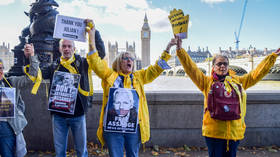Assange tests positive for Covid-19 in prison

Wikileaks founder Julian Assange has tested positive for Covid-19 and is being kept in total isolation at Belmarsh Prison as he continues to fight extradition to the US, his wife Stella told media on Monday.
“The next few days will be crucial for his general health,” the lawyer, who married Assange in March, told reporters, adding “He is now locked in his cell for 24 hours a day.” Assange became sick on Friday with a cough and fever and was given paracetamol before testing positive for the virus the following day, she said.
The Australian native applied in early 2020 to be released on bail due to a chronic lung condition he has suffered from for over a decade, placing him in a high-risk category for Covid-19 infection. However, his request was declined, and a UK court ruled earlier this year that he can be extradited to the US to face espionage and hacking charges for making classified Pentagon documents public.
The Wikileaks publisher’s health has suffered noticeably during his confinement in Belmarsh, where he has been confined since the Ecuadorian government revoked his asylum status in 2019. He lost a significant amount of weight and the ability to speak coherently following his incarceration, leading prison authorities to move him to the hospital wing. In December, he suffered a stroke, leaving him with a drooping eyelid, memory problems and apparent neurological damage, according to his wife, who said the incident was triggered by the stress of ongoing extradition proceedings.
Prior to his arrest, Assange spent seven years under de facto house arrest in London’s Ecuadorian embassy, having fled there to avoid extradition to Sweden on sex crimes charges that have since been dropped. While he has long since served time on the only charge brought against him in the UK – bail-jumping regarding the no-longer-extant Swedish case – he remains incarcerated pending extradition to the US.
While a UK court initially ruled in his favor against extradition, agreeing with his lawyers that he would be kept in conditions in the US that would easily provoke suicide, that ruling was reversed last year.
Assange faces a 175-year sentence on charges he leaked secret documents he received from a US Army analyst regarding the Afghanistan and Iraq wars. Wikileaks supporters have argued that he was only practicing journalism by publishing the documents, which were redacted to remove some sensitive information, and accused Washington of retaliation against the outlet for exposing its own war crimes.














